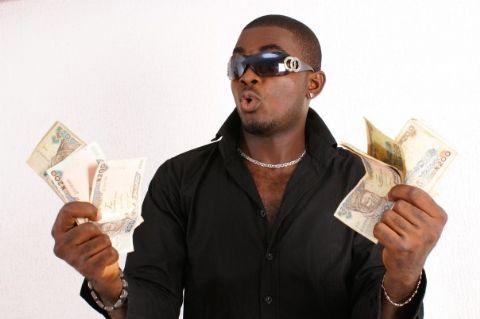
One doesn’t have much problem distinguishing the lyrics of the new generation Nigerian musicians because most of them stamp their ownership not only through an ‘intro,’ but also throughout the tracks. Maga don pay crooner, Kelly Hansome, is no exception. Right from his intro track, Bad Man, in his CD titled 2 Much Money, he made it known that he is the ‘commander of the Dot.com forces,’ Kelly Hansome, “a home boy from Ala Owerri [Owerri land] precisely in Imo State.”
For these new generation Nigeria artists, like those before them, their songs are reflections of the realities of the times. Just like a film producer would recreate happenings in his/her society, so also do musicians take trips to the lands of creativity to give ‘flesh’ to their experiences.
Since amassing great wealth is the dream of many Nigerians, artists inclusive, it is not surprising that the new generation musicians in the country are falling over themselves, boasting about this new ‘money value’.
So it is no surprise that Hansome is preoccupied with making “too much money” in this musical effort.
His 13-track CD is a medley. From hip hop to reggae, there is something for everyone. E no Easy is the story of his life and he made it known it is a true story, “his own story.” He debunks the rumour that a certain big boy signed him on, bought a Hummer jeep and gave him N5 million, amongst other gifts. He enumerates his efforts at making money, having heeded his mother’s advice to work hard. “My mama tells me/ if I work hard/ I go make am,” he sings. He even joined the “Dot.com” (scam) business, in the past, in his quest for wealth.
Nwachinemere is a reggae track with plenty street jargons. Onwere ife neme (Nothing dey happen) is one phrase that has crept into the vocabulary of the daring in Nigeria. “I dey feel like Jonathan (Goodluck)/Okocha/ DJ Jimmy Jatt” reminds one of Tuface Idibia’s I dey feel like Obasanjo. However, the good sound reminds one of root, rock, reggae greats like Alpha Blonde, Peter Torch and others.
There is something fleetingly Tuface about the track, My True Love, but it makes for good listening. Slow, but something one may find himself nodding to if there’s no dancing room. It also has a reggae undertone.
Maga don pay, the title track is danceable, that is, if you do not have any moral squabble over the lyric, ‘Maga, don pay, shout Hallelujah.’ Phrases like owo, ego, money, too much money, naira, dollar et cetera, stream into the listener’s consciousness as he/she savours the rhythm.
There is something foreign about the rhythmic arrangement of the track, Hapuya. Even the lyric seems refined but then, it is unmistakably Naija.
Like play like play is a waist-wining inducing dancehall track that is heavy on instrument. Before the artist talks about wining the waist, the dance freak who relates beat to dance step has already started doing just that.
In all, the CD boasts of some good dance hall tracks, many with good tempo and if played non-stop, may make a good listening. However, some of the tracks are filled with street slang and words that can best be described as lewd. There is the fear that too much dose of such words, which incidentally are found in the songs of many Nigerian musicians, may have negative impact on young minds.




















